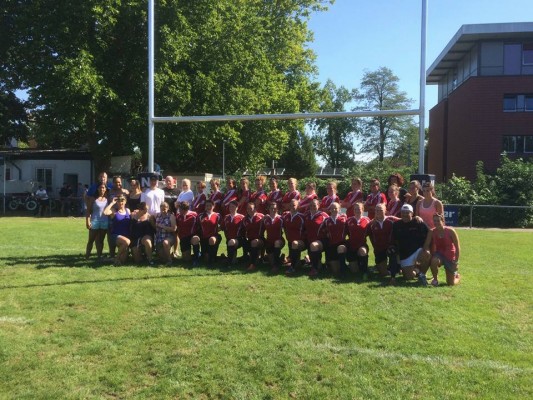Germany: Building a new test team
In April, the German Rugby Union (DRV) agreed to reform their women??s (15s) test team after an absence of nearly seven years...
Published by John Birch, May 19, 2016
7 minute read

: First of all congratulations on your appointment as coach and assistant coach of the re launched national team. After nearly seven years, the DRV have agreed to put the team back to the international stage, but only limited to two years, with its continuation dependent on an evaluation of "efficiency and financial viability". What can be achieved in such a short time?
Thank you for the congratulations! We hope to fulfil the trust placed in us, and it is certainly not the easiest task we have undertaken in of our rugby careers! Fortunately, we are in taking this on alone. The club and most state associations are behind the new women's team and will help us, as far as is humanly possible. Our team, which is now completed with Bianka H??usler (management) and Julia Rettig (PR), will be a great help.
The DRV is basically positive about the project, and hopes for success. However, the DRV can offer limited practical?support and has asked the DRF (the German Women??s union) to manage the project.
The first evidence they are looking for is a competitiveness and feasible national team. Of course, from a completely new start, two years is a short time to remove the doubts within the DRV about the performance and potential of a women??s test team, but given the resource constraints the overall planning will therefore be geared towards this sole aim.
Last year, - which was practically a national team - against Switzerland which showed that we will be able to win international matches. International comparisons of our teams have shown the potential that a German test team has.
However, it is also clear that although we reforming the team now we will soon need to meet stronger opponents. On the other hand, will have to achieve the highest standards if we are to be successful.
Our first goal is to play against, with modest means and optimum organization, a manageable but challenging and successful international team. Our team management is in talks with the Belgian Federation for a match in the autumn. We hope that we have a very physically demanding game to start with and Belgium would be historically right opponents as the Belgians were the last opponent for our national team in 2010. In 2017 we hope for a matches against Switzerland and then Netherlands, as a next step.
As early as next year, the Women's World Cup is being held in Ireland. To qualify to play in it would be well beyond expectations. But were you planning to play in the European qualifying tournament with teams like Belgium and Switzerland this autumn?
Yes, to participate in the World Cup in 2017 would be a utopian dream in fact, but the qualifying tournament is far also too soon for us to ensure we have the right preparation and financing.
In discussions with the DRV participation was never intended. However, we hope to play in September against the last year's winners of the European Championship, as part of the Belgians tournament preparations. So we will get an understanding of how we would compare with a team in World Cup qualifying. This is a challenging task and fits into our concept.?
Maximising the training time of potential players for national team with the distances between the strong clubs in Heidelberg, Hamburg, Hanover and Cologne will not be easy. How will you tackle this problem?
That is probably the biggest problem. A well-functioning team should provide more joint training time; which is a challenge. To this end, our preparatory work will have to be very short and intense. We will try to compensate for this in cooperation with the regional associations, by conducting focused training, for example, on key areas of the game, such as the set pieces. We already have had discussions with the Baden-W?ªrttemberg and North Rhine-Westphalia, and more will follow. We also want to sift players during these decentralized training activities.
Of course, some players from the sevens team will also be candidates for your team. If scheduling conflicts will this become a problem?
This, in comparison, is the least problem in our view. Of course we want to, and have to, draw on the ability of the 7s internationals. But our potential opponents in the next two years will have the same constraints as we will be subjected to, with them as with us the 15s activities are likely to be focused in the second half of the year.
We have to keep in mind the health and development of each athlete. We need to ensure that we work closely with the club coaches and the coaching staff of the 7s team. We do not work against each other, but together promote German Rugby.
If, after the expiry of the two-year trial, the DRV come to the conclusion that a continuation of the project test team would make sense, what might be the long term possibilities for a German team? Is the World Cup in 2021 a possible target?
Our mission, in the next two years, is to create a practical 15s team. In the medium term beyond that we must aim to be a regular leader in European competitions. But a future World Cup finals may well be a target, especially if World Rugby converts expands the starting field to 16 teams. We are convinced that Germany can become one of the top eight European teams.